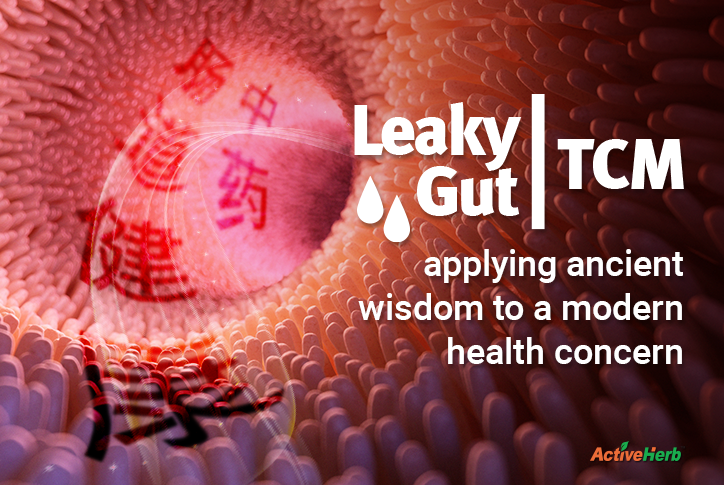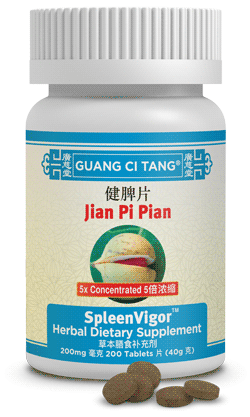Leaky Gut & TCM: Applying Ancient Wisdom To A Modern Health Concern

There’s a modern scourge that you’re probably not hearing about in the media and it sounds like something out of a horror movie: leaky gut.
No, leaky gut isn’t something that happens in a slasher flick, when a victim is impaled and all the blood and guts are disturbingly revealed.
Actually, in ancient times, a horrendous battle wound was the only known cause of toxins or metabolic waste in the intestines leaching into the bloodstream. However, in modern times, leaky gut has become a pervasive problem. Thankfully, it’s not because of conflicts, but rather an everyday battle against environmental assaults (herbicides, pesticides, air pollution, etc.), industrial food production and nutrient-deficient diets, the overprescribing of antibiotics and chronic stress.
If leaky gut is a modern health concern, how can a 5000-year-old traditional system of medicine help? Leaky gut & TCM don’t exactly go hand in hand like peanut butter and jelly. Or can they?
What Is Leaky Gut?
To understand leaky gut, picture a screen door. A screen door has thousands of tiny holes, large enough to let in the cool breeze but small enough to keep out bugs. Essentially, this is how your intestines operate. The lining of your small intestines, also called the endothelial lining, consists of only one extremely thin layer. The endothelial cells are held together by tight junctions. You can think of these tight junctions as links on a chain necklace. In a healthy gut, the junctions allow fully-digested food particles to cross into the circulation but prevent undigested particles, viruses and bacteria from escaping into the bloodstream.
In Western medicine, when the spaces in between the cells are too large, this condition is known as intestinal hyperpermeability, or as it’s also more colloquially-known, leaky gut.
There’s a chicken-versus-egg debate in the medical community about leaky gut. Does leaky gut directly cause health conditions? Or were the health conditions there first, thereby causing leaky gut?
Whichever side of the debate you’re on, one thing is certain. Leaky gut symptoms may affect more than the digestive system. Brain fog, joint discomfort and skin irritations are just a few of the symptoms associated with this umbrella term.
How Does TCM Address Leaky Gut?
Like most western medicine doctors, a Chinese medicine doctor will not diagnose you with having a leaky gut. The condition is very complex; taking one or two Chinese herbs will not fix the problem.
And like any other health concern, a TCM practitioner determines the priority of organs that need to be addressed. In general, there are three TCM organs that will likely be operating in a state of imbalance if the small intestine lining is too porous: the Liver, Spleen and Kidney. Most often addressing leaky gut in this specific order is necessary.
Getting the Liver to operate in a state of Yin/Yang harmony is most important because of its responsibility to dredge toxins from the body. Whatever the cause of a leaky gut, be it taking too many courses of antibiotics without repopulating the gut with friendly bacteria or poor diet, the Liver becomes overburdened with stored toxins. Those trapped toxins eventually find their way into the lymphatic system and other bodily tissues.
As a result, Qi becomes stagnant, Blood may be deficient and excess heat accumulates, leading to Phlegm. These are general conditions that arise. Again, only a TCM practitioner can properly diagnose the specific patterns that contribute to leaky gut symptoms.
Spleen Qi & Kidney Deficiency
After addressing Liver imbalance, it’s Spleen’s turn next. Spleen, in TCM, is the digestion powerhouse of the body. The TCM diagnostic pattern of Spleen Qi deficiency can lead to incomplete digestion. Thus it’s imperative to get the Spleen channel back into balance. A balanced Spleen organ prevents leaky gut by maintaining the integrity of the tissues in the small intestine. (The western anatomical small intestine, not the TCM organ system). In addition, better Spleen function results in optimal nutrient absorption.
If the small intestinal wall is letting toxins and undigested food particles into the bloodstream, the immune system may attack bodily tissues. This can also affect the Kidney channel of TCM. If this is the case, the Kidney organ system becomes weak (deficient). Kidney Yin (cooling) energy is most often first to need rebalancing. Next on the list to resolve, if necessary is Kidney Yang. When Kidney Yang is in balance, the adrenal glands, which release stress hormones, receive better support. (The adrenal glands are a part of the 8 extraordinary meridians of TCM.)
Chinese Herbal Support
Unfortunately, there is no magic pill or one single formula in TCM—or in any system of medicine—to resolve leaky gut.
To reiterate, the condition may be the result of several factors and addressing it also likely requires a multi-factorial approach.
The good news is that TCM offers time-tested herbal formulas to support digestive health, joint health, skinskin, cognitive function, and dozens of other health topics.
To address Liver Qi stagnation, learn about LiverVive.







